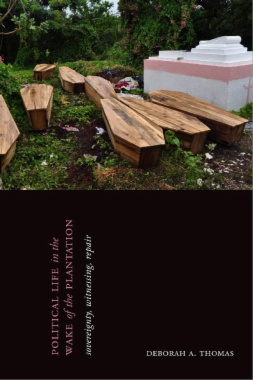In 2010, Jamaican police and military forces entered the West Kingston community of Tivoli Gardens to apprehend Christopher “Dudus” Coke, who had been ordered for extradition to the United States on gun and drug-running charges. By the time Coke was detained, somewhere between seventy-five and two hundred civilians had been killed. In Political Life in the Wake of the Plantation, Deborah A. Thomas uses the incursion as a point of departure for theorizing the roots of contemporary state violence in Jamaica and in post-plantation societies in general. Drawing on visual, oral historical, and colonial archives, Thomas traces the long-term legacies of the plantation system and how its governing logics continue to shape and replicate forms of violence. She places affect at the center of sovereignty to destabilize disembodied narratives of liberalism and progress and to raise questions about recognition, repair, and accountability. In tying theories of politics, colonialism, race, and affect together with Jamaica's history, Thomas presents a robust framework for understanding what it means to be human in the plantation's wake.
- Cover
- Contents
- Preface��������������
- Introduction. Humanness in the Wake of the Plantation
- 1. Doubt
- Interlude I. Interrogating Imperialism
- 2. Expectancy
- Interlude II. Naming Names
- 3. Paranoia
- Coda. The End of the World as We Know It
- Acknowledgments
- Notes������������
- References�����������������
- Index������������
- Photographs 1
- Photographs 2

